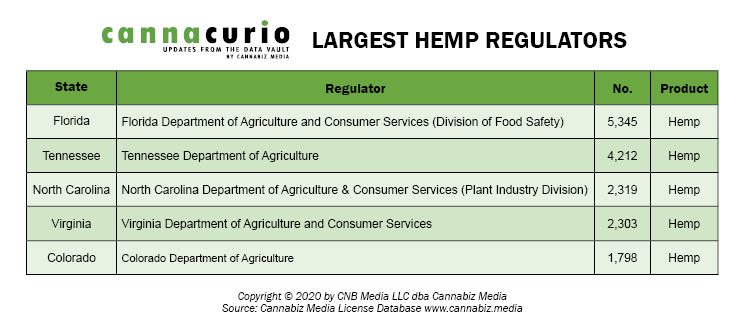
Cannacurio: a regulator that rules them all!
Be the first to know when new content like this is available!
Subscribe to our newsletter to receive notifications of new posts, local news and industry insights.
Many Thanks! Your submission has been received!
Oops! There was an error submitting the form.
With the licenses in the Cannabiz Media database surpassing the 100,000 threshold earlier this year, we’ve been looking for ways to help our users make better use of all of this information. Jason Kikel, our director of regulatory research, made the latest improvement by adding a field to keep track of which regulator issued the license. One of the driving forces behind Jason was the emergence of non-state licenses. The U.S. Department of Agriculture oversees state and tribal hemp cultivation programs. In addition, the agency has a register of over 60 analytical test laboratories licensed by the DEA and issues producer licenses for some hemp growers. Here’s what we found in our regulatory review:
Main results
- Nationwide there are 93 unique regulators for hemp and cannabis programs
- Illinois, Utah, and Louisiana are the only states that have a regulator that issues both hemp and cannabis licenses
- California has the most licenses with a total of 11,088 licenses (1,514 hemp and 9,574 cannabis).
Which states have the most licenses?
We’ve included leaderboards in most of our blog posts to give a sense of scalability. In the table above, the distribution of cannabis and hemp licenses varies depending on the federal state. California and Oklahoma are at the forefront thanks to cannabis. Florida is there by virtue of CBD retail licenses. Tennessee, North Carolina, and Virginia are full of licenses to grow hemp.
Markets like California, Colorado, Oregon, and Washington are especially notable for having both hemp and cannabis licenses that include cultivation and processing. This makes them excellent markets for suppliers selling products like soil improvers, extraction equipment, and even greenhouses.
Which states have the most regulators?
We saw a variety of regulatory structures as states came up with new and novel ways to regulate the investment. Here are the states with the most regulators:

One of the interesting footnotes here is that California is known to have three different regulators for cannabis and one for hemp. Colorado, on the other hand, has three for hemp and one for cannabis. There are plans for California to combine their three into one.
On the hemp side, most states use an existing regulatory infrastructure. It is viewed and treated as another “harvest”. With cannabis, states tend to create a new monolith to handle the regulations – which actually makes sense given its federal status.

The table above shows the largest hemp regulators that we have identified. Florida’s numbers are driven by the thousands of CBD retail licenses they have issued. The remaining states have approved thousands of farmers.

As we have documented over the past few years, Oklahoma is a leader in licensing and all of them are issued by OMMA (Oklahoma Medical Marijuana Authority). The three California regulators top this list, along with mature market states like Colorado, Washington, and Oregon. Michigan is a market to watch as some experts believe it could be second only to California.
Why is that important?
The interesting point when comparing regulators and government markets is how perceptions can change when you combine hemp and cannabis. Cannabiz Media tracks nearly 35,000 licenses for active hemp and cannabis cultivation. We believe that knowing that Oregon’s 2,285 cultivators are split almost halfway between cannabis and hemp is important information when planning your marketing strategies for the fourth quarter and 2021.
In addition, it is vitally important to follow federalization of test lab regulation and hemp plans. Some experts believe these approaches could be part of bringing together a federal cannabis regulatory system. While there may never be “one regulator that rules everyone” – this is a trend that needs to be monitored.
Cannabiz Media customers can stay up to date on these and other new licenses through our newsletter, alert and reporting modules. Subscribe to our newsletter to receive these weekly reports in your inbox. You can also schedule a demo for more information on how to access the Cannabiz Media License Database yourself to delve further into this data.
Cannacurio is a weekly column from Cannabiz Media that offers insights into the most comprehensive license data platform. Check out Cannacurio posts and podcasts for the latest updates and information.

Post a comment: